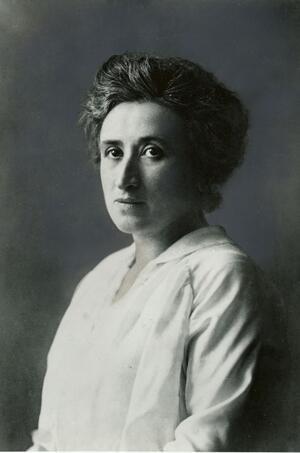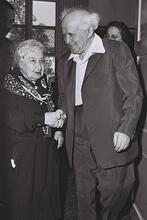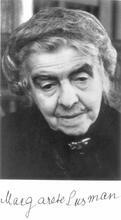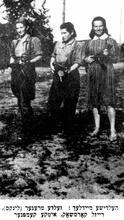Rosa Luxemburg
Rosa Luxemburg was a socialist revolutionary known for her critical perspective. In 1887 she fled her homeland of Poland and completed her dissertation in Zurich two years later, in which she claimed that a socialism based in Polish nationalism is self-defeating. By 1913 Luxemburg was an important figure in the world socialist movement, known for her internationalist orientation and her theory that imperialism is intrinsically connected with capitalism. She argued against Leninism and its hierarchal conception of party organization, and against the fatal limits of revisionism. While in jail during WWI, Luxemburg penned her prophetic work The Russian Revolution, in which she exposed the compromises that would ultimately undermine the Soviet experiment. Luxemburg adhered unflinchingly to her radical democratic vision, and she was eventually murdered for it – by proto-Nazi thugs in 1919.
Commitment to Internationalism
Rosa Luxemburg was one of the great Marxist theorists of the twentieth century; her radical conception of socialist democracy stands in opposition to both bolshevik authoritarianism and technocratic reformism. Born in the Polish city of Zamosc (75 km SE of Lublin), she grew up in an assimilated, middle class Jewish family. She learned German at home and, undoubtedly, a certain affinity for enlightenment ideals. Luxemburg would never join the famous Jewish socialist organization known as the Bund, and she was basically unconcerned with issues of identity. It was during her high school years that she met Leo Jogiches (1867–1919), who would play a central role in the history of continental socialism. They became youthful lovers, but even after the end of their romantic relationship, they would continue to work together. Her engagement with political issues began while she was still in high school as a member first of the Proletariat, the first socialist organization in Poland. Internationalist in orientation, concerned with building a mass base, it was decimated by the government following the strike wave of the 1880s. Luxemburg fled her homeland in 1887 and later enrolled in the University of Zurich, where she completed a dissertation on “The Industrial Development of Poland” (1898).
This important study claimed that the economic development of Poland was interconnected with that of the Russian empire as a whole: a strategy based on Polish nationalism would subsequently impede modernization and prove self-defeating. Luxemburg steadfastly refused to concede that support for nationalism—or ethnic identity—was anything other than a serious compromise of proletarian principle. According to her, nationalism not only perpetuates capitalism by dividing workers from one another, and serves to justify wars in which the proletariat will suffer, but is also atavistic in a period defined by global capitalism. These concerns would receive articulation in her major economic work, which sought to examine the intrinsic connection between capitalism, nationalism, militarism and imperialism: The Accumulation of Capital (1913).
Imperialism Theory
In this work Luxemburg sought to investigate the systemic conditions which made capitalist accumulation possible in the first place. Goods obviously had to be sold, to accumulate the profit that capitalists would reinvest to perpetuate the system. But, given the claims by Marx that capitalist production necessarily outstrips demand, she noticed that no incentive existed for capitalists to reinvest. Without reinvestment the system would collapse, so that an outlet for the profitable disposition of excess goods had to exist. That outlet she saw in terms of exports to pre- capitalist territories: in short, imperialism.
Imperialism is subsequently neither a mere aberration of an otherwise healthy system, as reformers wished to believe, nor “the highest stage of capitalism” (Lenin). Luxemburg saw it as intrinsically connected with capitalism from the beginning. And yet, since the flow of capitalist goods into pre-capitalist areas would eventually transform them into industrial ones, it was also obvious to her that capitalism must create its own historical limit beyond which looms the spectre of “breakdown.” As for the interim, it will become marked by increasingly ferocious competition between advanced states for those steadily diminishing pre-capitalist territories. Militarism and nationalism will therefore grow in conjunction with the imperialism that capitalism engenders.
Although this provides an explanation for World War I, Luxemburg’s theory can neither explain why not every capitalist state follows an expansionist foreign policy nor envisage imperialism by a “socialist” state. Then, too, if her theory provides no hope of reforming imperialist tendencies in the advanced capitalist states, neither does it lead to any practical revolutionary policy for the colonized peoples. There is only the implicit need for the transnational organizations of workers to confront an ever more interdependent capitalist economy.
Revisionism & Leninism
Throughout her career Rosa Luxemburg involved herself with the international organization of workers—and, by 1913, she had become an important figure in the world socialist movement. Her ascent had begun with the decision to enter the powerful German Social Democratic Party (SPD) and her contribution to what became known as the “revisionist debate”. That debate had been initiated by Eduard Bernstein (1850–1932), whose analysis concluded that the SPD should surrender its revolutionary political aims and concentrate on a policy of compromise with non-proletarian classes to ensure economic reforms so that socialism could gradually “evolve” within capitalism.
In Social Reform or Revolution (1899) Luxemburg argued, contrary to Bernstein, that credit would not eliminate the crisis character of capitalism and that the expected concentration of capital was taking place. Fearing that an unrestricted politics of class compromise could justify any choice by the party leadership, and shift power to the trade unions, she also argued that there were limits to reform; that trade unions could never govern the actual level of wages or resolve the basic contradiction between social production and private appropriation of wealth that defines the capitalist production process. Even regulating wages and working conditions depended upon political power; without a political revolution, she argued, the reform granted under one set of conditions could be retracted under another. A simple emphasis on economic reform would thus result only in a “labor of Sisyphus.” Indeed, without an explicitly socialist “goal,” she believed, the SPD would increasingly succumb to capitalist values and so surrender its sense of political purpose.
Yet, from Luxemburg’s perspective, “revisionism” and Leninism were merely opposite sides of the same coin. Her Organizational Questions of Social Democracy (1904) constitutes a response to the Bolshevik leader. Though Lenin’s estimation of the trade unions as purely “defensive” organizational forms accorded with her own, which was also the case with his claim that economic reform would not automatically result in the growth of political consciousness, Luxemburg rejected his hierarchical, quasi-military conception of party organization. Though she refused to presuppose class consciousness and recognized the need for a party to organize workers, she never believed it possible to inject consciousness into the proletariat “from the outside” by a vanguard composed of professional revolutionary intellectuals.
A Radical Democratic Vision
Just as she rejected a revisionist vision of the party run by experts and basically concerned with incremental socio-economic issues, she opposed the idea of a revolutionary organization based on blind obedience which would erect an “absolute dividing wall” between the leadership and the base. If socialism is to transform workers from “dead machines” into the “free and independent directors” of society as a whole, she argued, they must have the chance to learn and exercise their knowledge. Indeed, this very concern led her to embrace the Russian revolution of 1905, which inspired what is arguably her finest theoretical work, Mass Strike, the Political Party and Trade Unions (1916).
Luxemburg took part in the revolutionary events and experienced first-hand the innovative possibilities of the masses in democratically organizing their milieu. In fact, she saw the mass strike as a way to overcome the “artificial” bifurcation of the economic struggle of the unions from the party’s commitment to a political transformation of the given order. The concept articulates her concern with furthering an organizational dialectic between party and base that would gradually build the self-administrative capacities of workers by helping them develop new democratic institutions and then, at a different stage of the struggle, even newer ones.
This radical democratic vision stayed with her throughout the years of World War I, which she spent in a tiny prison cell. It was there that she wrote a response to the various critics of her imperialism thesis known as the Antikritik (1915), translated Russian authors into German, composed her beautiful letters to friends and lovers, and—under the pseudonym Junius—produced the great antiwar pamphlet The Crisis in German Social Democracy (1916), which mercilessly assaulted the SPD for its willingness to support the Kaiser’s war, its obsession with votes, its cowardice in the face of public opinion and its betrayal of working-class interests.
Her most prophetic work, however, was surely The Russian Revolution. Also written in jail, while she was in ill health and with little information other than from newspapers, it exposed the compromises that would ultimately undermine the Soviet experiment. Opposed to Lenin’s agrarian policy, continuing to reject the use of slogans implying the “right of national self-determination,” her analysis is best known for its demand that the “dictatorship of the proletariat”—as the “transitional” phase of socialist construction— should extend democracy both in terms of republican values and popular institutions that would allow for the direct participation of the working class in administering social life. And yet, she viewed these compromises and deformations as products of the regime’s weakness which itself was born of underdevelopment and isolation. Indeed, Rosa Luxemburg was among the first to analyze the Russian Revolution from an internationalist perspective which stressed the unfulfilled political obligations of social democracy.
Death & Legacy
Following her release from prison in 1918, she joined the Spartacus group—which would form the nucleus of the German Communist Party (KPD)—and publicly advocated the creation of “soviets” (or “workers’ councils”). Despite their almost legendary stature, however, the Spartacists never received the support of a proletarian majority—and Rosa Luxemburg knew it. She warned against unleashing the revolution in Germany and urged participation in the elections to a National Assembly which would constitute the Weimar Republic. But she was outvoted. The Spartacist revolt broke out in 1919 and Rosa Luxemburg, seeking to remain in contact with the masses, was brutally murdered at the hands of proto-Nazi thugs in the employ of the government.
No matter what the movement with which she was connected, Rosa Luxemburg maintained her critical perspective as well as her commitment to socialism, democracy and internationalism. Luxemburg never sought any special treatment for women and, essentially, her view of sexism was similar to that of antisemitism: both would ultimately be abolished with the creation of socialism. In this vein, while she built a large private circle of exceptionally loyal female friends, she differed from Lili Braun (1865–1916) who believed in the need for an independent women’s movement. Luxemburg supported women’s suffrage and she was close friends with the great feminist and socialist activist, Clara Zetkin (1857–1933). But Luxemburg saw socialism as a movement of the proletarian masses that should emphasize unity and equality rather than highlight the oppression of any particular group. Realizing that mass action necessarily incorporates an experimental dimension, she refused to admit that socialism is exhausted by the reforms and programs of party professionals or that the interests of workers are ever directly identifiable with those of even the most dynamic party or revolutionary movement. This undogmatic commitment to an unfinished notion of freedom undercut her influence within the dominant socialist and communist organizations. At the same time, it helped place her at the forefront of the most libertarian tendencies in the socialist tradition of theory and practice—and that is precisely where she remains.
Selected Works
The Accumulation of Capital. 1913. Reprinted New York, 1968
The Complete Works of Rosa Luxemburg, Volumes I and II. Edited by Peter Hudis and Paul Le Blanc. Translated by Nicholas Gray and George Shriver London: Verso, 2013 and 2016.
The Essential Rosa Luxemburg: Reform or Revolution and the Mass Strike. Edited by Helen Scott. Chicago: Haymarket Books, 2008.
The Letters of Rosa Luxemburg. Edited by Annelies Laschitza, Georg Adler, and Peter Hudis. Translated by George Shriver. London: Verso, 2011
The Mass Strike, the Political Party, and the Trade Unions. 1906. Reprinted New York, 1971
The National Question: Selected Writings of Rosa Luxemburg. Edited by Horace B. Davies. New York: Monthly Review Press, 1976.
Rose Luxemburg: Selected Political Writings. Edited by Robert Looker. London: Jonathan Cape, 1972
Rosa Luxemburg Speaks. Edited by Mary Alice Walters. New York: Pathfinder Press, 1970
Socialism or Barbarism: The Selected Writings of Rosa Luxemburg. Edited and with an Introduction by Paul Le Blanc and Helen C. Scott. London and New York: Pluto Press, 2010
Bronner, Stephen Eric. Rosa Luxemburg: A Revolutionary for our Times. (3rd Printing). Pennsylvania: Penn State University Press, 1997.
Dunayevskaya, Raya. Rosa Luxemburg, Women’s Liberation, and Marx’s Philosophy of Revolution. Atlantic Highlands, NJ: Humanities Press, 1981
Frohlich, Paul. Rosa Luxemburg: Her Life and Work. New York: Monthly Review Press, 1972
Geras, Norman. The Legacy of Rosa Luxemburg. London: New Left Books, 1976
Nettl, J. P. Rosa Luxemburg, New York: Oxford University Press, 1966
Wistrich, Robert S. “The Internationalism of Rosa Luxemburg.” From Ambivalence to Betrayal: The Left, the Jews, and Israel, 344-378. Lincoln, NE: University of Nebraska Press, 2012.






